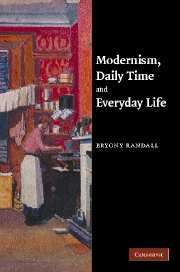Book contents
- Frontmatter
- Contents
- Acknowledgements
- List of abbreviations
- Introduction: dailiness
- Chapter 1 The contemporary context: Henri Bergson and William James
- Chapter 2 Dailiness in Dorothy Richardson's Pilgrimage
- Chapter 3 Re-creation, work and the everyday in Gertrude Stein
- Chapter 4 War-days: H.D., time and the First World War
- Chapter 5 Reading, writing and thinking: a Woolfian daily life
- Afterword
- Notes
- Bibliography
- Index
Chapter 1 - The contemporary context: Henri Bergson and William James
Published online by Cambridge University Press: 22 September 2009
- Frontmatter
- Contents
- Acknowledgements
- List of abbreviations
- Introduction: dailiness
- Chapter 1 The contemporary context: Henri Bergson and William James
- Chapter 2 Dailiness in Dorothy Richardson's Pilgrimage
- Chapter 3 Re-creation, work and the everyday in Gertrude Stein
- Chapter 4 War-days: H.D., time and the First World War
- Chapter 5 Reading, writing and thinking: a Woolfian daily life
- Afterword
- Notes
- Bibliography
- Index
Summary
INTRODUCTION: DAILINESS AT THE TURN OF THE CENTURY
What is now one of the canonical texts of literary modernism – in particular that strand of modernism that addresses questions of temporality and memory – takes as its foundational event the ineffable moment between sleeping and waking. Proust's lengthy description of the anxious reassembling of self that takes place upon waking, which opens A la recherche du temps perdu, draws attention not only to the increasingly prominent question at the time of what constitutes the individual human subject, but also works with the effects of both the normal succession of, and the disruption to, diurnal patterns, day following night following day. The moment of waking, both utterly familiar and deeply mysterious, is used in a similar way by the turn-of-the-century psychologist William James. In his key textbook of the emerging discipline of psychology, the Psychology: Briefer Course on which my observations in this chapter are based, James illustrates the way in which we recognise and construct the self as a unity, evoking the fundamental familiarity of the self: ‘Each of us when he awakens says, Here's the same old Me again, just as he says, Here's the same old bed, the same old room, the same old world’ (Psy 215). The unity of the self is demonstrated by the sameness that characterises the dawning of each new day.
- Type
- Chapter
- Information
- Modernism, Daily Time and Everyday Life , pp. 29 - 58Publisher: Cambridge University PressPrint publication year: 2007



